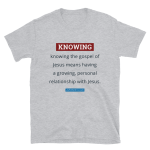Pastors need help. Their jobs are 24-7, and they are expected to be experts in a wide variety of tasks. As a result, burnout among ministers has reached epidemic levels. Ministers facing burnout often feel overwhelmed and overstretched by the obligations and expectations placed on them by their congregations. As Barbara Blake of the Asheville, North Carolina, Citizen-Times noted:
It’s a job description not for the faint of heart, and the work schedule is brutal: 24 hours a day, seven days a week.
In addition to often being a spouse and parent, a clergy member is often simultaneously a writer and orator (sermons), Biblical scholar, chaplain to the sick or dying, teacher, executive director, CEO, human resource manager, therapist, liaison to other community organizations and point person answerable to church hierarchy and the governing bodies of their denominations.
Pastors cannot do everything—there are simply not enough hours in the day. Pastors cannot be experts at everything—they will be better at some things than they are at others. Nevertheless, pastors are the leaders and the visionaries of their churches; they are the general overseers and the caretakers of their flocks. Many, though, receive help from associate ministers who serve in specific areas of ministry. To put it another way, if pastors were medical personnel, they would be general practitioners and, as such, they would need the help of specialists.
Pastors: Spiritual General Practitioners
Seminary education for pastors often covers a wide variety of subjects: theology, pastoral ministry, counseling, preaching, biblical languages (Greek and Hebrew), church administration, Old Testament and New Testament surveys, and church history. However, such a breadth of training usually means the graduate receives a general knowledge of most things, but an in-depth knowledge of few things. Even if they seek a doctorate, their expertise is limited to an individual field. Therefore, in ministry they often rely on the expertise of ministerial specialists when it comes to other areas of ministry.
When our son, David, was born, the doctors at the hospital noticed that there was something wrong with his liver. To diagnose him, they didn’t call his pediatrician, despite his broad medical knowledge and years-long relationship with us. Rather, they called a specialist. However, in spite of her training, she sought assistance from other specialists. After multiple specialists across the Unites States were consulted, it was determined that our son was born with an “undiagnosed liver disease.”
Could David’s pediatrician have made this determination? Possibly. However, although he possessed some knowledge of the liver, he assured us that a specialist was the best choice for this aspect of David’s medical care. Similarly, many pastors are spiritual general practitioners who must depend on the help of ministry specialists.
Ministry Specialists: Helping Pastors and Churches in Specific Ministries
[pullquote]The outreach minister works with the pastor to devise an overall strategy to increase the congregation’s personal evangelism and improve the church’s corporate evangelism.[/pullquote]
Churches often recruit individuals for specialized ministry duties. Some of the more common are youth, children, music, education, and administration ministers. Each of these fulfills a need and can help the church answer its missional calling. When seeking individuals to fill this positions, churches often look for people with certain gifts, abilities, and training in these areas; they look for experts, or specialists. A youth minister does not need to know how to sing or play music to teach youth any more than a music minister needs to be trained in youth ministry to lead a choir or praise team.
Budgetary issues sometimes require churches to merge many of these specialties (youth and music is a common combination), requiring the person to excel in more than one field. Whether or not specialties are combined, churches generally seek experts in order to assist the pastor in his duties as leader and visionary of the congregation. One specialty, however is often overlooked or misused: outreach.
The Outreach Minister: Developing and Implementing Evangelism Strategies
Jesus instructed us to follow in his mission “to seek and to save that which was lost” (Luke 19:10). He created the church for his glory and then gave her a specific task: make disciples (Matt 28:18-20; Acts 1:8). Jesus saves individuals for the gospel mission which he prepared beforehand (Eph 2:10; cf. Rom 1:16-17; 6:4).
Recognizing that evangelism is their mission, many churches adopt vision statements, promote evangelism, and schedule outreach events. Nevertheless, few consider recruiting a specialist in developing evangelistic outreach strategies. Instead, they expect the pastor to fulfill that role, even if his expertise is in an area of ministry other than evangelism (such as counseling or theology). Sometimes pastors may lack training, skills, or gifts in evangelistic strategy, yet to their credit, they do the best they can based on their general knowledge. However, because they are not specialists, they are no more capable at leading in outreach than they are a leading youth or music.
The Value of Outreach Ministers
Most pastors envision an evangelistically outreaching church. Many, however, are not certain how to accomplish this, especially in an ever-changing society. Furthermore, many pastors lack the time to analyze settings, develop strategies, and design methods to improve a church’s evangelistic outreach. An outreach minister helps the pastor realize his vision.
Just as the music minister focuses on music and the education minister focuses on small group studies, the outreach minister focuses on developing an evangelistic strategy for the church. He analyzes the church’s neighborhood, resources, and historical methods. From this, he then works with the pastor to devise an overall strategy to increase the congregation’s personal evangelism and improve the church’s corporate evangelism. He thus frees the pastor to focus on pastoral care, theological teaching, and overall leadership of the church.
However, not just anyone is capable of serving as an outreach minister. Just like with other specialties, there are certain characteristics and criteria that the person should meet.
The Characteristics of Outreach Ministers
An outreach minister does not necessarily need a formal education in evangelism (though that is a big plus). He must, however, exhibit certain characteristics (other than the ministerial standards listed in 1 Timothy and Titus):
- He must be gospel-centered. His focus should be on gospel proclamation and evangelistic outreach, not on mere church promotion or simply increasing membership rolls and attendance numbers.
- He must prioritize conversion growth. There are four types of church growth: transfer (believers changing churches), biological (members having children), prodigal (members returning after leaving the church), and conversion (non-believers becoming Christians). Much of what the church does for outreach unintentionally targets and achieves transfer growth.1 The outreach minister must be focused on reaching non-believers.
- He should have a background in evangelism. This can be either formal training, experience, or both. Few individuals hold degrees in evangelism, making them a rare asset. Regardless, the outreach minister should be familiar with historical and contemporary evangelistic philosophies and methods.
- He must be flexible to new approaches. An effective outreach minister cannot be bound to past methods. Cultures change, and thus evangelistic strategies must also change. The outreach minister should be willing to adopt new methods to promote the unchanging message.
- He should encourage personal and corporate evangelism. The outreach minister should be dedicated to improving a congregation’s personal evangelism and well as the church’s corporate evangelism.
- He should be a skilled communicator, teacher, and administrator. In order to develop and implement a strategy for evangelistic outreach, the specialist should be able to communicate effectively, teach others, and be able to oversee others.
Pastors throughout the world face burnout due to the demands of their jobs. Leading a church is difficult and stressful. Associate ministers specializing in specific areas such as youth, education, and music are recruited to help the pastor lead the congregation. However, many churches and pastors overlook the vital role of outreach minister. This area of ministry is dedicated to accomplishing the Great Commission by helping the pastor developing an overall strategy and methods to reach people with the gospel of Christ.
1 James Emery White, The Rise of the Nones: Understanding and Reaching the Religiously Unaffiliated (Grand Rapids: Baker Books, 2014), ch. 6.















This Post Has 2 Comments
Hello, I appreciate the article. But I have a question. What if the pastor does not have an out reach minister. Infact, what if no one actually knows how to do an actual outreach activity at church? How else can a chufch grow?
Hello Brother n,greetings in the name of our savior Jesus ,whatever is stated above i agree.But I want your consultation that for about 10 years me and my wife (high school retired teachers)are ruining a tution centre in Lahore Pakistan to earn our living and to help our community to improve their education beside this we care for a sunday school and keep contact with our community by door to door evening prayers,we want to serve our Lord,please guide us how can we make our services useful .God bless you
Pastor ,
Michael Bhatti ,
Gulberg 111,Lahore.
Pakistan